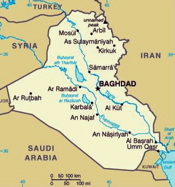BAGHDAD -- In a recent investigative hearing at the Central Criminal Court of Iraq (CCCI) in Baghdad, a detainee held by the U.S.-led Multi-National Force-Iraq (MNF-I) gave his version of the events leading up to his detention in a village in al-Anbar province, and his subsequent transfer to the Iraqi court for possible prosecution. The detainee, clad in a standard-issue bright yellow jumpsuit, explained that the weapons caches found on and next to his property were part of an elaborate set-up arising out of a feud with a neighboring family. According to the detainee, he was not involved in insurgent activity and had no knowledge of the existence of the weapons caches. He further claimed that members of the local Awakening Council, known to Iraqis as a sahwa, were cooperating with U.S. forces, had taken part in the raid of his house, and had planted the weapons to implicate his family. He went on to state that the bad blood between the two families had arisen when his uncle, a former member of the sahwa, had attempted to break off and found his own such group. As an observer of the investigative hearing, I had no way of judging the veracity of this particular detainee's exculpatory account of events or the weight of the evidence against him. However, the accusations he levied against the sahwa cast light on the fact that American soldiers navigating the complex terrain of Iraqi tribes, families, and feuds will inevitably alienate portions of the civilian population and be obliged to cooperate with groups engaged in activities that will undermine confidence in the U.S. military or instigate violence against it. While these local alliances have had a significant impact on the security situation in areas once ravaged by the Sunni insurgency, the United States must now take advantage of the present opportunity to ensure that the government of Iraq implements concrete measures to formalize the relationship of the sahwat to the central government. Absent such concerted action, the recent spike of violent insurgent operations directed at the sahwat could herald the collapse of the fragile security gains of the past two years.
Still No Clear Path for Integrating ‘Sons of Iraq’ into Iraqi Government

